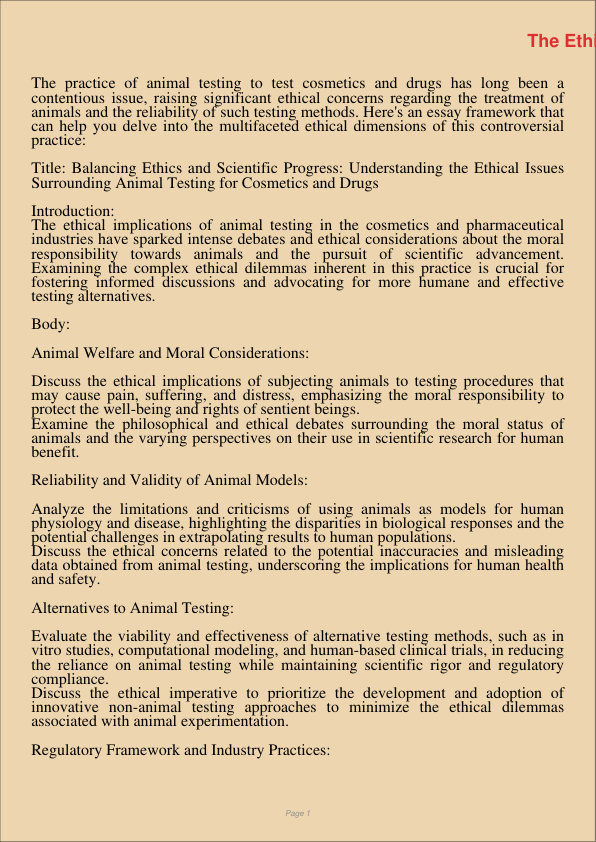The Ethical Issues On The Practice Of Animal Testing To Test Cosmetics And Drugs
Jan 12, 2024
test cosmetics
ethical issues
Human Resources
Religion and Theology

The practice of animal testing to test cosmetics and drugs has long been a contentious issue, raising significant ethical concerns regarding the treatment of animals and the reliability of such testing methods. Here’s an essay framework that can help you delve into the multifaceted ethical dimensions of this controversial practice:
Title: Balancing Ethics and Scientific Progress: Understanding the Ethical Issues Surrounding Animal Testing for Cosmetics and Drugs
Introduction: The ethical implications of animal testing in the cosmetics and pharmaceutical industries have sparked intense debates and ethical considerations about the moral responsibility towards animals and the pursuit of scientific advancement. Examining the complex ethical dilemmas inherent in this practice is crucial for fostering informed discussions and advocating for more humane and effective testing alternatives.
Body:
Animal Welfare and Moral Considerations:
Discuss the ethical implications of subjecting animals to testing procedures that may cause pain, suffering, and distress, emphasizing the moral responsibility to protect the well-being and rights of sentient beings. Examine the philosophical and ethical debates surrounding the moral status of animals and the varying perspectives on their use in scientific research for human benefit.
Reliability and Validity of Animal Models:
Analyze the limitations and criticisms of using animals as models for human physiology and disease, highlighting the disparities in biological responses and the potential challenges in extrapolating results to human populations. Discuss the ethical concerns related to the potential inaccuracies and misleading data obtained from animal testing, underscoring the implications for human health and safety.
Alternatives to Animal Testing:
Evaluate the viability and effectiveness of alternative testing methods, such as in vitro studies, computational modeling, and human-based clinical trials, in reducing the reliance on animal testing while maintaining scientific rigor and regulatory compliance. Discuss the ethical imperative to prioritize the development and adoption of innovative non-animal testing approaches to minimize the ethical dilemmas associated with animal experimentation.
Regulatory Framework and Industry Practices:
Examine the existing regulatory frameworks governing animal testing in the cosmetics and pharmaceutical industries, assessing the adequacy of ethical guidelines and animal welfare standards in ensuring responsible and humane research practices. Discuss the ethical responsibilities of industry stakeholders in implementing transparent and accountable procedures for minimizing animal suffering and prioritizing the development of cruelty-free products and testing methodologies.
Ethical Decision-Making and Advocacy:
Propose ethical guidelines and policy recommendations for promoting a more compassionate and scientifically robust approach to testing cosmetics and drugs, emphasizing the importance of ethical decision-making and corporate social responsibility. Advocate for the advancement of public awareness and education campaigns to foster consumer demand for ethical products and encourage the adoption of ethical practices that prioritize animal welfare and human safety.
Conclusion: Striking a balance between scientific progress and ethical considerations is imperative in the ongoing discourse surrounding the practice of animal testing for cosmetics and drugs. By advocating for the adoption of humane testing alternatives and promoting ethical decision-making at all levels of the industry, society can foster a culture of compassion and innovation that prioritizes both human well-being and animal welfare.
By utilizing this framework, you can construct a comprehensive essay that critically examines the ethical challenges and implications of animal testing for cosmetics and drugs, incorporating ethical theories, scientific evidence, and stakeholder perspectives to underscore the complexity and urgency of this critical ethical issue.